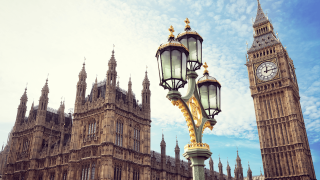Archived article
Please note that tax, investment, pension and ISA rules can change and the information and any views contained in this article may now be inaccurate.

Markets had been taking their lead from the opinion polls and pricing in a clear-cut victory for the Conservative Party and that is what they have got. I have even heard some psephologists assert the Tories have won their largest percentage of the vote since 1970 – which is some ways is pretty ironic, as in 1970 the Conservative leader and winner was Edward Heath, a committed European who took us into the Common Market (as it was then), while now the Prime Minister is the same party’s Boris Johnson, whose mantra is to get Brexit done and take the UK out of the EU.
But even though the polls were spot on, we have still see some violent moves, the most notable being the pound. Sterling nearly got to $1.35, a 19-month peak, and €1.21, a three-year high, before giving up a little ground.
Meanwhile the headline FTSE 100 stock index is showing an early gain of around half a percent
The FTSE 100 is responding to both overnight advances in the USA and Asia, which resulted from President Trump’s latest tweet promising a trade deal with China that may avert the imposition of more tariffs on Sunday 15th, and also the election result as – rightly or wrongly – the opposition Labour Party was generally perceived to be anti-business and anti-profit.
That relatively muted move is partly the result of sterling’s surge. Remember that the trade since the June 2016 referendum result has generally ‘pound down, FTSE 100 up’, as sterling’s slide increases the value of the index’s multinational member’s overseas assets and profits. It therefore makes sense that the pound’s rise should cap the FTSE 100 a bit, as that decreases the value of the overseas assets owned and profits generated by sectors like oil, mining, pharmaceuticals, aerospace and defence once they are translated back into sterling.
Brexit could also still be a factor too. Mr Johnson is promising that he will get it done – but trade deals must now be struck and markets are already thinking about the December 2020 transition deadline. Unless that is extended – something Mr Johnson has said he would not accept – then the UK could still leave with ‘no deal’ and leave markets with the ‘hard Brexit’ scenario that they have been worried about for three and a half years, amid concerns over what it may mean for trade and the economy. Ultimately, no-one knows what a hard Brexit outcome could look like and as we know markets hate uncertainty.
The FTSE 250 is up strongly in early trade and by quite a bit more than the megacap FTSE 100, with a rise of almost 4%. This is because the mid-cap benchmark contains more names which rely on the UK for their business. A strong pound may cap imported raw material costs for them, tamp down inflation and therefore put more money in consumers’ pockets on a real-terms, post-inflation basis.
The leading gainers include housebuilder Persimmon, Barratt Developments, British Gas owner Centrica, Virgin Money UK, International Consoliated Airlines, Lloyds and Stagecoach.
The biggest fallers include big overseas earners such as Diageo, GlaxoSmithKline, AstraZeneca and Rentokil.
Note that these are also relatively defensive plays stocks known for solid growth and reliable, high-quality earnings. The leaders, by contrast, are more cyclical, as if the market is pricing in an acceleration in economic and earnings growth, thanks either to a break in the Brexit deadlock or increased Government spending.
Some stocks are also responding to specific policy announcements. The utilities and transport and infrastructure stocks are welcoming a Labour defeat as that averts the threat of nationalisation. The housebuilders will be looking to the Government to follow up on promises to look at stamp duty land tax, for example.
As a final point, note that the yield on the benchmark 10-year UK Government bond, or Gilt, has gone to 0.82% from 0.77% overnight – and as yields rise, prices fall.
This probably reflects how Prime Minister Johnson and his Chancellor, Sajid Javid, have promised to turn on the Government spending taps – although not to the degree that the Labour team of Jeremy Corbyn and John McDonnell had intended to.
It is possible that Brexit – as it possibly reverses some of the disinflationary globalisation trend that has been in place since the early 1980s - and a move to looser fiscal policy, coupled with ongoing ultra-loose monetary policy, finally lead to the inflation that central bankers, politicians and economists crave – but they will have to be careful what they wish for, in case they overshoot. The 1970s showed that once the inflation genie comes out of the bottle it is very hard to cram it back in.
And the 1970s also showed that inflation was not a friend for equities - or bonds or cash in that decade. The best place to be was gold, which has risen quite nicely in 2019 after a long spell in the doldrums. Maybe the precious metal can sense a change in the market mood music as equity markets look to price in the cyclical growth which has been missing for most of the last decade and even the sustained return of inflation.
These articles are for information purposes only and are not a personal recommendation or advice.
Related content
- Wed, 17/04/2024 - 09:52
- Tue, 30/01/2024 - 15:38
- Thu, 11/01/2024 - 14:26
- Thu, 04/01/2024 - 15:13
- Fri, 17/11/2023 - 08:59

